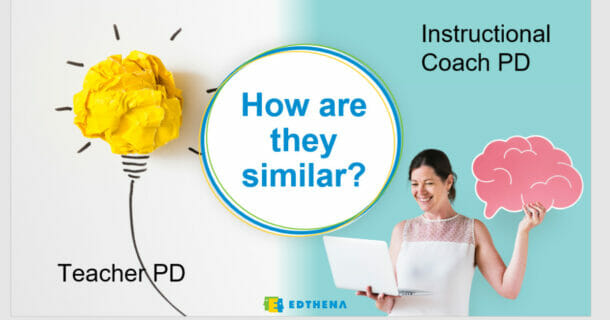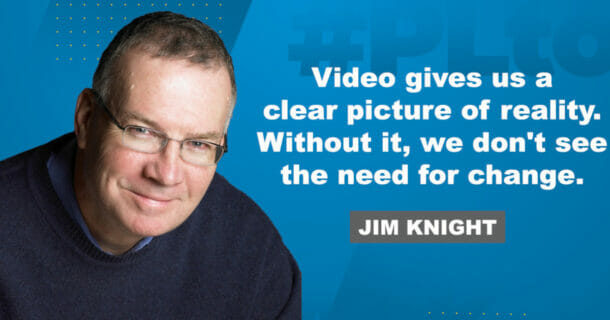4 Ways Professional Development for Coaches is More Like Teacher PD Than You Think
Professional development for coaches is more similar to professional development for teachers than you may think.
We know that continual improvement is crucial for educators. Teachers strive to improve their teaching, and instructional coaches aim to get better at coaching those teachers.
One type of PD works for instructional coaches and teachers: video coaching.

Video coaching using videos from classrooms to reflect on and share with peers for feedback and collaboration is effective for 4 reasons for videos of coaching practices:
- Video coaching is aligned to meeting adult learners’ needs
- Coaches can use the same processes as those they coach
- Mirroring the habits and skills they’re asking of teachers
- Professional learning and development can be applied to real-life situations
Here is more about each of the reasons why you should consider video coaching as effective professional development for instructional coaches.
1. Video coaching meets adult learners’ needs
The first principle of adult learning, as outlined by Malcolm Knowles, is the idea of self-concept.
Self-concept means that adult learners are self-directed and need to be involved in the design of their own learning.
Essentially, instructional coaches should be in the driver’s seat of their own professional development and improvement.
Enter video coaching, which empowers coaches to reflect on videos of their own coaching (such as a recording of a coaching conversation). This enables coaches to take ownership of identifying their strengths and areas of growth.
When instructional coaches can observe their own practice through video coaching, they can independently assess what they need to work on.
This is the first step to meeting adult learners’ needs.
2. Coaches can engage in the same best practices as teachers
When teachers engage in video coaching to self-observe and get feedback from colleagues, they’re building habits of reflective practice and collaboration.
Shouldn’t coaches build those same habits and skills, too?
Leaders, such as instructional coaches, can be more effective when the teachers they’re coaching see that coaches are practicing what they preach.
So if professional development for teachers includes recording their teaching, professional development for coaches should include recording their coaching.
3. Use the same PD methods for coaches and teachers
When you use one platform to support professional learning for teachers and for teacher coaches it’s simple to keep track of everyone’s goals and learning.
If the professional learning for coaches and teachers is similar in a way, such as using video, all educators in a building or district can share processes.
This eliminates having different platforms for different people, something that can quickly become edtech overload.
With Edthena Video Coaching, all teachers and instructional coaches can upload their videos to the same platform. Groups can be created to help coaches stay organized to collaborate with only those who are on the same team or working on the same skills.
4. Coaching improvement isn’t just about theory

Teachers viewing their own teaching videos is key to helping paint a clear picture of reality, and it’s the same for instructional coaches.
According to instructional coaching expert Jim Knight, video observation is crucial:
There are several reasons why we don’t have a clear vision of what we do while performing. Perceptual errors and defense mechanisms often keep us from seeing reality the way that it is.
Accepting our mistakes every day could affect who we are, so instead, we do things like blame other people or minimize the problem. So combining all of those reasons, what we think is happening and what is really happening is quite different. Because we don’t see a clear picture of reality, we don’t see the need for change. We minimize the problem or explain things away.
People are more motivated when they see reality. What’s more, it ensures that they focus on the right areas. When you use video in instructional coaching, it’s a dramatically different experience.
Getting better at coaching means accurately assessing your strengths and areas for growth.
Using video coaching helps coaches stay rooted in the evidence of their practices. By watching and sharing videos of their coaching, coaches are looking at the actual real-world implementation of their coaching, not just discussing coaching theory.
That’s true professional development for coaches.
Video coaching: effective for teachers, effective for instructional coaches
Video coaching for teachers is becoming common for many schools because it is a research-based method for professional learning. This is why more schools and districts are implementing video reflection as part of their instructional coaching development plans, too.
In summary, video coaching as a way to provide professional development for coaches is:
- Aligned to adult learners’ needs
- Easy to streamline for all educators
- Helpful to coaches to mirror teacher habits and skills
- Applicable to real-life situations
All types of educators can use video coaching to improve their practice, whether that’s teaching or coaching.



